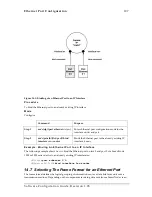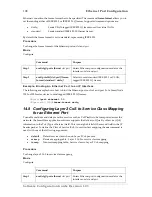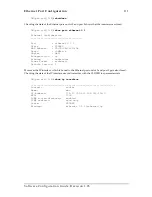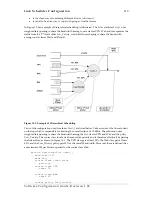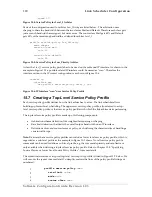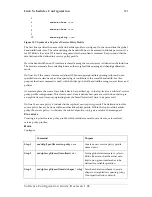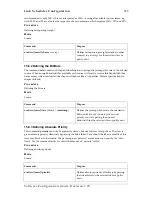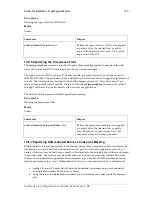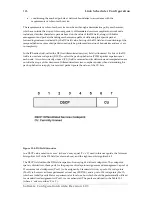
Link Scheduler Configuration
121
Software Configuration Guide, Revision 1.03
5
…
6
source class
name
7
…
8
source class
name
9
…
10
source policy
name
Figure 15-7: Syntax of a Top-Level Service Policy Profile
The first line specifies the name of the link arbiter profile to configure. On the second line the global
bandwidth limit is set. The value defining the bandwidth has to be entered in kilobits per second, i.e.
for 512 kBits/s the value 512 is used as argument for the rate-limit command. Keep in mind that the
rate limit must be defined in a service policy profile.
How the bandwidth on an IP interface is shared among the source classes is defined on the third line.
The mode command allows selecting between the weighted fair queuing and shaping arbitration
mode.
On lines 4 to 9 the source classes are defined. When using weighted fair queuing (wfq) each user-
specified source class needs a value specifying its contribute to the overall bandwidth. For this
purpose the share command is used, which divides up the full bandwidth among source classes and
policies.
At a certain place the source class
default
has to be specified, e.g. in the top-level or a sub-level service
policy profile configuration. This class is used, since it defines how packets, which do not belong to
an explicit class and are not originating from the SmartNode itself, have to be processed.
On line 10 a source policy is included in the top-level service policy profile. The definitions for this
source policy have to be done within another link arbiter profile. Within the top-level link arbiter
policy the source policy—in this case the sub-level profile—only gets a relative share assigned.
Procedure
Creating a top-level service policy profile, which includes several source classes, or lower level
service policy profiles.
Mode
Configure
Command
Purpose
Step 1
node
(cfg)# profile service-policy
name
Creates a new service policy profile
named
name
Step 2
node
(pf-srvpl)[
name
]#rate-limit
value
Limits global interface rate to
value
in
kBit/s. Be aware, that the actual rate-
limit on an given interface has to be
defined for reliable operation.
Step 3
node
(pf-srvpl)[
name
]#mode
{
shaper | wfq}
Sets the arbitration scheme to mode
shaper or weighted fair queuing (wfq).
If not specified wfq is default.
Summary of Contents for SmartWare R2.00
Page 2: ......

